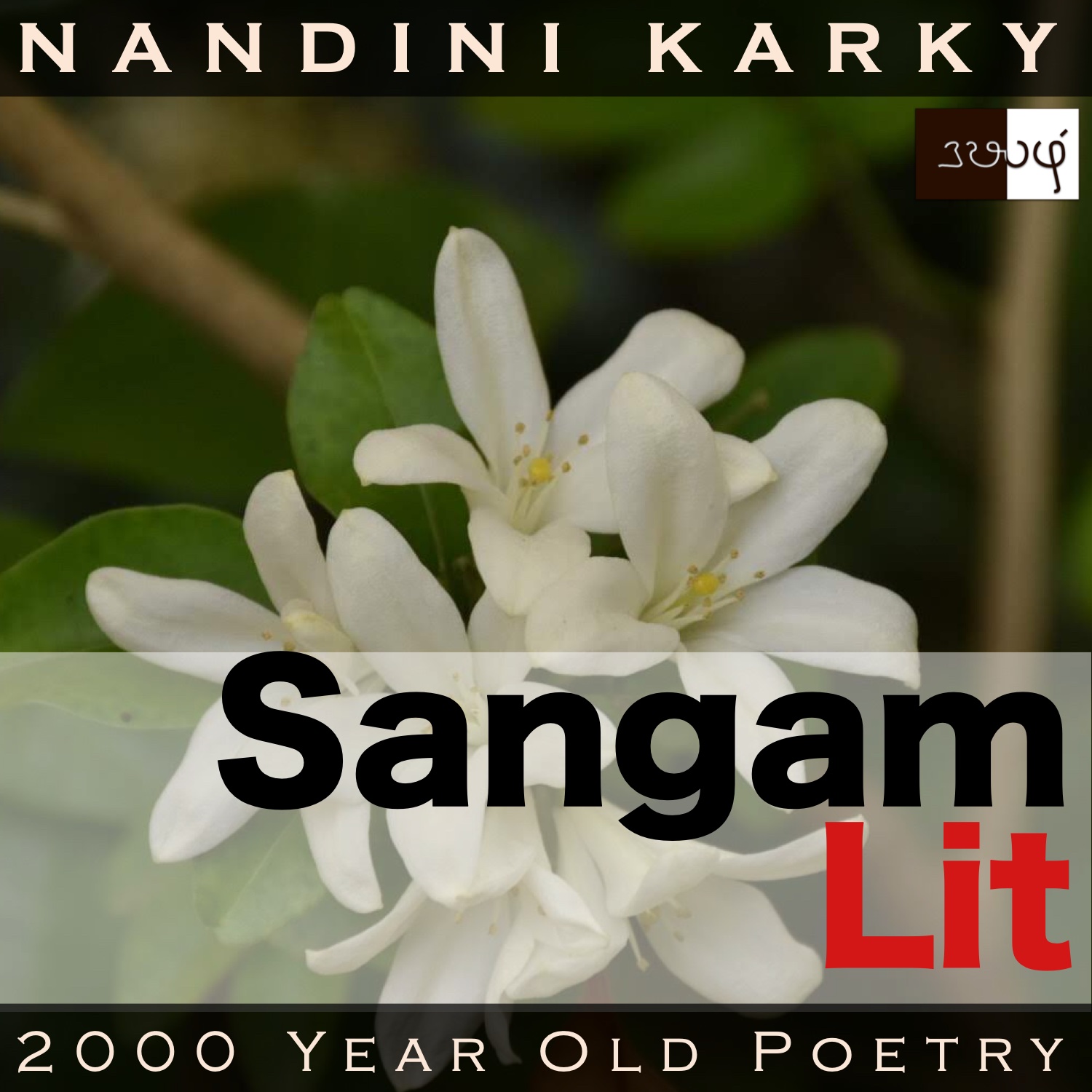Podcast: Play in new window | Download
Subscribe: Apple Podcasts | Spotify | Amazon Music | Android | iHeartRadio | Email | TuneIn | RSS | More

In this episode, we listen to consoling words rendered to an anxious heart, as depicted in Sangam Literary work, Kurunthogai 358, penned by Kotranaar. Set in the forests of ‘Mullai’, the verse speaks in the voice of the confidante to the lady, as the man remains parted away.
வீங்குஇழை நெகிழ, விம்மி, ஈங்கே
எறிகண் பேதுறல்; ‘ஆய்கோடு இட்டுச்
சுவர்வாய் பற்றும் நின் படர் சேண் நீங்க
வருவேம்’ என்ற பருவம் உதுக்காண்:
தனியோர் இரங்கும் பனி கூர் மாலைப்
பல் ஆன் கோவலர் கண்ணிச்
சொல்லுப அன்ன, முல்லை வெண் முகையே.
‘He will be here soon’ is the promising message herein! The opening words ‘வீங்குஇழை நெகிழ’ meaning ‘tight-fitting jewels loosening’ is a trademark Sangam symptom of pining. A significant phrase appears in ‘ஆய்கோடு இட்டுச் சுவர்வாய் பற்றும் நின் படர்’ meaning ‘that suffering of yours, wherein you cling to the wall and draw lines’, about which we will delve into, shortly. Time of the day is revealed in ‘பனி கூர் மாலை’ meaning ‘the cold evening hours’. An object of adornment can be spotted in ‘பல் ஆன் கோவலர் கண்ணி’ meaning ‘the garland of cowherds, who have many cattle’. Ending with the words ‘முல்லை வெண் முகையே’ meaning ‘white buds of wild jasmine’, the verse welcomes to breathe in the fresh fragrance within!
On one side, jewels are withering off and on the other, jasmines are blooming! The context reveals that the man and lady were leading a happy, married life when the man parted away to gather wealth. As can be expected, the lady languishes in his absence. Seeing her friend’s distress, the confidante says to the lady, “Making those well-fitted jewels slip away, whimpering, with eyes shedding tears, do not be confused. He said, ‘To cast away your suffering of standing by the wall and drawing those lines marking time, I shall return then’. That season he spoke of, in those words, is here. For it’s a cold evening, which torments the parted, and now, the garlands of cowherds returning with many cattle announce the blooming of the wild jasmine’s white buds!”. With these words, the confidante assures the lady that the man’s return is inevitable and imminent.
What makes the confidante so sure? Let’s understand by listening to her words intently. The confidante starts by talking about how the lady’s bangles are slipping away and how she is at the heights of sorrow, shedding tears. Asking her friend not to worry so, the confidante reminds her of how the man told the lady that he would return by a particular season to end the suffering of the lady, as she sticks close to the wall and counts the lines marking the days of his parting. That season is here, the confidante declares. How does she know? On that cold evening, as cowherds return to the village after a day of letting their cattle graze in the forest, something new seems to be smiling from around their necks. Behold! It’s a garland of wild jasmines in bloom. It’s the rainy season the man promised to return and the wild jasmines have bloomed, indicating the same. So, how can he be far away, the confidante seems to ask the lady.
A curious verse that tells us about two different ways of measuring time. The lady seems to be drawing lines to mark every day the man has been away, and while she has locked herself within the walls, the confidante has stepped out and seen the blooming jasmines on the cowherds’ garlands. With time, the practice of keeping time with flowers and elements of the world outside has changed, and we too, have become like the lady, locked within, drawing lines on her walls, when we look at our smartphones and laptops for the time and day. Perhaps if we could step out, like the confidante, and truly see the blooming flowers and changing world, that mindfulness would allay the anxieties in our modern minds too!




Share your thoughts...